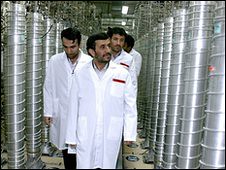
Iranian President Mahmoud Ahmadinejad has been targeted by the western imperialist states for regime change. The People's Republic of China has rejected calls for new sanctions in the United Nations Security Council., a photo by Pan-African News Wire File Photos on Flickr.
Iran to hold more talks with IAEA on nuclear energy program
Wed Feb 22, 2012 3:10AM GMT
presstv.ir
Iran's Ambassador to the International Atomic Energy Agency (IAEA), Ali Asghar Soltanieh says the country will hold further talks with the agency over its civilian nuclear energy program.
Soltanieh said on Tuesday that a second round of talks in Tehran between Iranian officials and a delegation from the body has ended.
The Iranian envoy said the talks had covered cooperation and mutual understanding between the Islamic Republic and the IAEA.
A high-ranking delegation from the IAEA, headed by the agency’s Deputy Director General Herman Nackaerts, came to the Iranian capital on Monday for negotiations on further cooperation.
Earlier on Tuesday, Iranian Foreign Ministry Spokesman Ramin Mehmanparast said Tehran was ready to hold a new round of talks over its nuclear energy program with the five permanent members of the UN Security Council -- Russia, China, Britain, France, and the US -- plus Germany, known as the P5+1 group.
In addition, Iranian Foreign Minister Ali Akbar Salehi said that the venue for Iran’s upcoming talks with the P5+1 group would be determined by the weekend.
“Turkey has announced preparedness to host [the talks]. However, some other countries may do the same,” Salehi said at a joint press conference with his Omani counterpart, Yusuf bin Alawi, in Tehran on Tuesday.
“God willing, on Saturday, after other parties announce their readiness, then Mr. Jalili and Mrs. Ashton will come to an agreement on the venue for the Iran-P5+1 talks,” he said, referring to Secretary of Iran's Supreme National Security Council, Saeed Jalili and the EU foreign policy chief, Catherine Ashton.
“Hopefully, by Saturday or Sunday, this will be determined.”
Iran and the P5+1 held two rounds of multifaceted talks in Geneva, Switzerland in December 2010 and in the Turkish city of Istanbul in January 2011.
While Iran has announced its readiness to continue the talks on common grounds, it has stressed that Tehran will not relinquish its rights.
The United States, Israel, and some of their allies accuse Iran of pursuing military objectives in its nuclear program, using this pretext to impose international and unilateral sanctions on the Islamic Republic.
However, the IAEA has never found any evidence indicating that Tehran's civilian nuclear program has been diverted towards nuclear weapons production.
The Islamic Republic is a member of the IAEA and a signatory to the nuclear Non-Proliferation Treaty. Hence, it is entitled to develop and acquire nuclear technology for peaceful purposes.
No comments:
Post a Comment